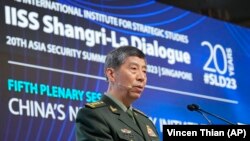At Asia's top security summit, China's defense minister, Li Shangfu, elaborated on Beijing's "new security initiative" using words such as "openness," "inclusiveness," "transparency," "equality," "the rule of law," "dialogue," "peace," and "win-win."
But in the question-and-answer session after his speech at the Shangri-La Security Dialogue in Singapore on Sunday, Li faced inquiries from attendees that appeared to show a regional belief that Beijing's words did not match its deeds in the disputed South China Sea, given its extensive maritime deployments in waters it claims as its own.
Li did not answer the questions directly, saying moves by countries outside the region were raising tensions. In his speech he accused "some countries" of intensifying an arms race and willfully interfering in the internal affairs of others, digs that appeared to target the United States.
"A Cold War mentality is now resurgent, greatly increasing security risks," he said, referring to decades of tension between the U.S. and what is now Russia. "Mutual respect should prevail over bullying and hegemony."
Austin rebukes China
The day before, U.S. Secretary of Defense Lloyd Austin spoke at the summit, rebuking China for refusing to hold military talks, leaving the superpowers deadlocked.
Philippine Coast Guard Commodore Jay Tristan Tarriela, a 2023 East-West Center fellow in Washington, asked Li about "the apparent disconnect between China's words and actions related to its maritime interaction with the Philippines and perhaps others in the region."
Tarriela pointed out that after Philippine President Ferdinand Marcos Jr. met Chinese leader Xi Jinping in Beijing in January, the two sides agreed to establish direct communication channels in the South China Sea and resolve waterway disputes "through peaceful means."
Yet on January 23, just a few weeks after the agreement was reached, the Chinese Coast Guard allegedly drove Philippine fishing boats from waters around Scarborough Shoal in the Philippines' exclusive economic zone. Then on February 23, a Philippine coast guard ship was irradiated by China's military-grade "laser," temporarily blinding one of its crew.
"While China is talking about dialogue, its actions show confrontation," Tarriela said.
China claims the South China Sea as its territory, putting it in conflict with Brunei, Indonesia, Malaysia, the Philippines and Vietnam, which also claim parts of the area rich in natural resources. The Philippines alone filed nearly 200 diplomatic protests against China's aggressive actions in the disputed waters in 2022.
Hoang Thi Ha, coordinator for the Regional Strategic and Political Studies Program at the ISEAS — Yusof Ishak Institute in Singapore, who was formerly with the ASEAN Department of the Ministry of Foreign Affairs of Viet Nam, also questioned Li.
"Generally, you meant and highlighted the importance of equity and justice throughout your speech. I would like to know how you see justice and equity [being] applied in the South China Sea disputes, where China has competing maritime and territorial claims with Southeast Asian countries," she said.
Li said in his speech on Sunday that China is willing to "make important contributions to maintaining world peace and play an active role in improving global governance ... China is willing to strengthen the awareness of the Asia-Pacific community of destiny with all parties, promote the healthy development of regional security cooperation, and strive to build an open, inclusive, transparent and equal regional security cooperation framework."
On Saturday, one of Beijing's navy ships cut sharply across the path of an American and a Canadian naval vessel, forcing the U.S. vessel to slow to avoid a collision. The U.S. military described the Chinese maneuver as "unsafe." Li, who is under U.S. sanction for buying arms from Russia, defended on Sunday his country's response, contending that the passage of the allied Western vessels on "freedom of navigation patrols" was a provocation to China.
Brent Sadler, a senior naval warfare and advanced technology research fellow in the Center for National Defense at the Heritage Foundation, attended the summit and told VOA Mandarin, "The general's entire comments were all about inclusion, the rule of law, and peaceful win-win kind of outcomes. But the actions don't align or comport with that at all. So, of course, just a few hours ago, we had the near collision. It was by order. It was not an accidental near miss. It was intentional."
After the session, Bonnie Glaser, managing director of the German Marshall Fund's Indo-Pacific Program, told VOA Mandarin in an email, "Main takeaway from the speech: China is determined to portray the U.S. as destabilizing the region and China as a responsible, peace-loving power. I doubt that his speech altered people's views in the region."
Adrianna Zhang contributed to this report. Information for this report came from Reuters and The Associated Press.






